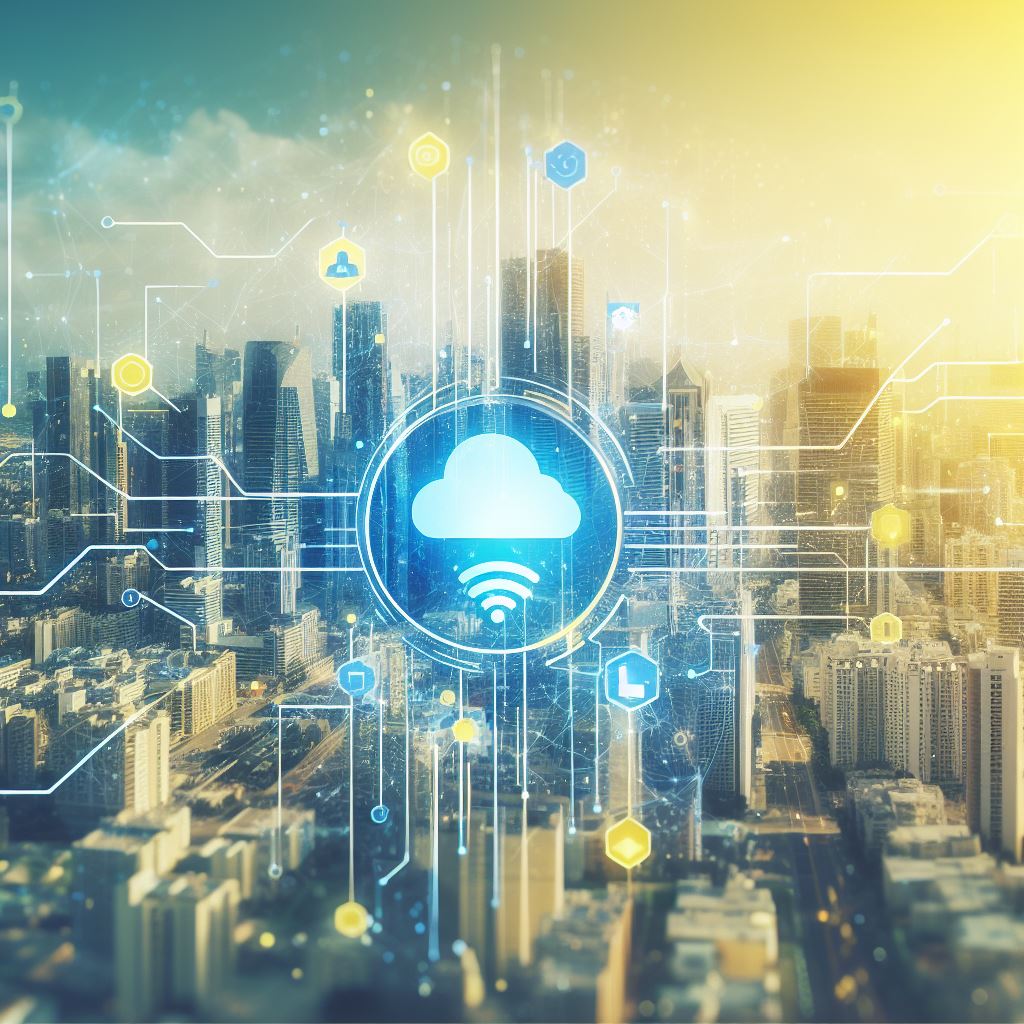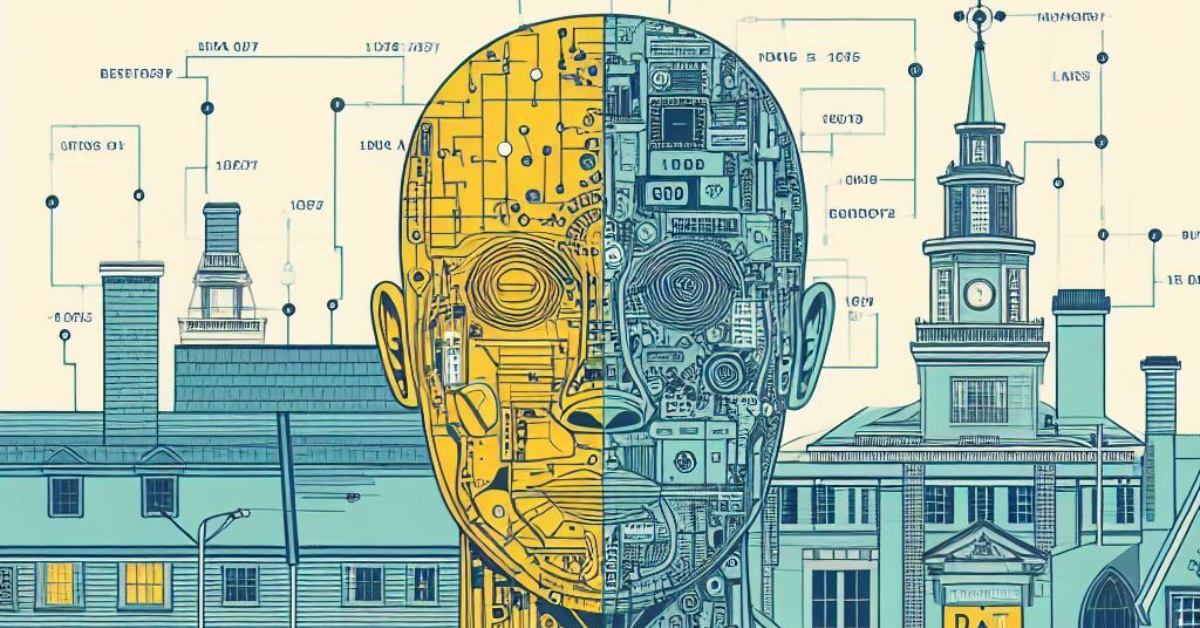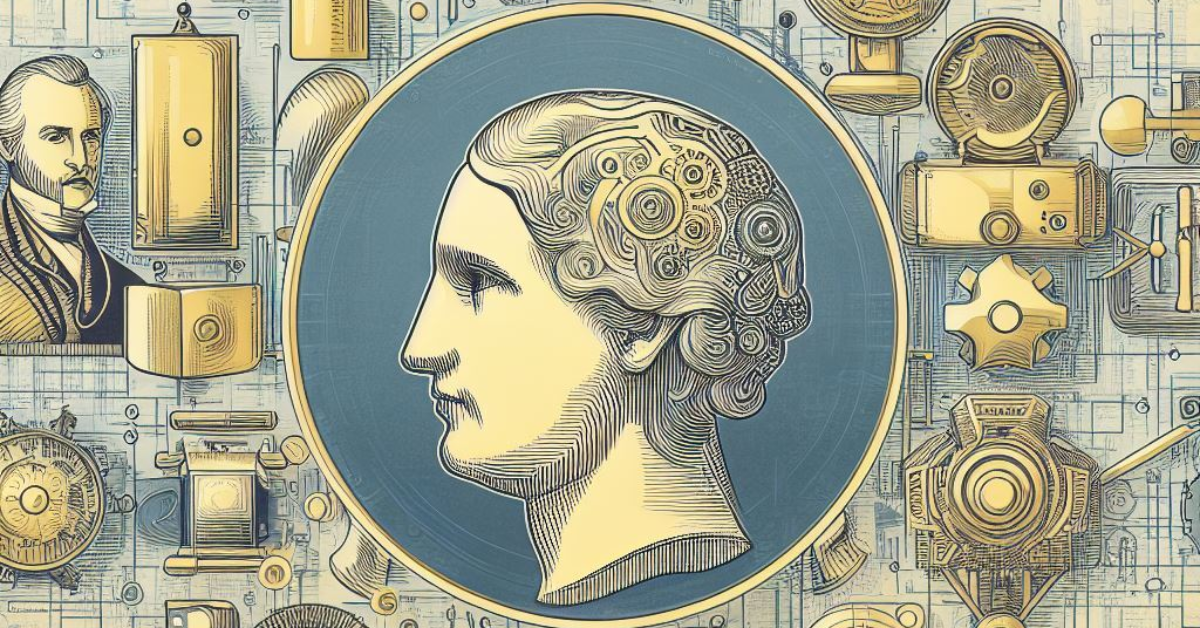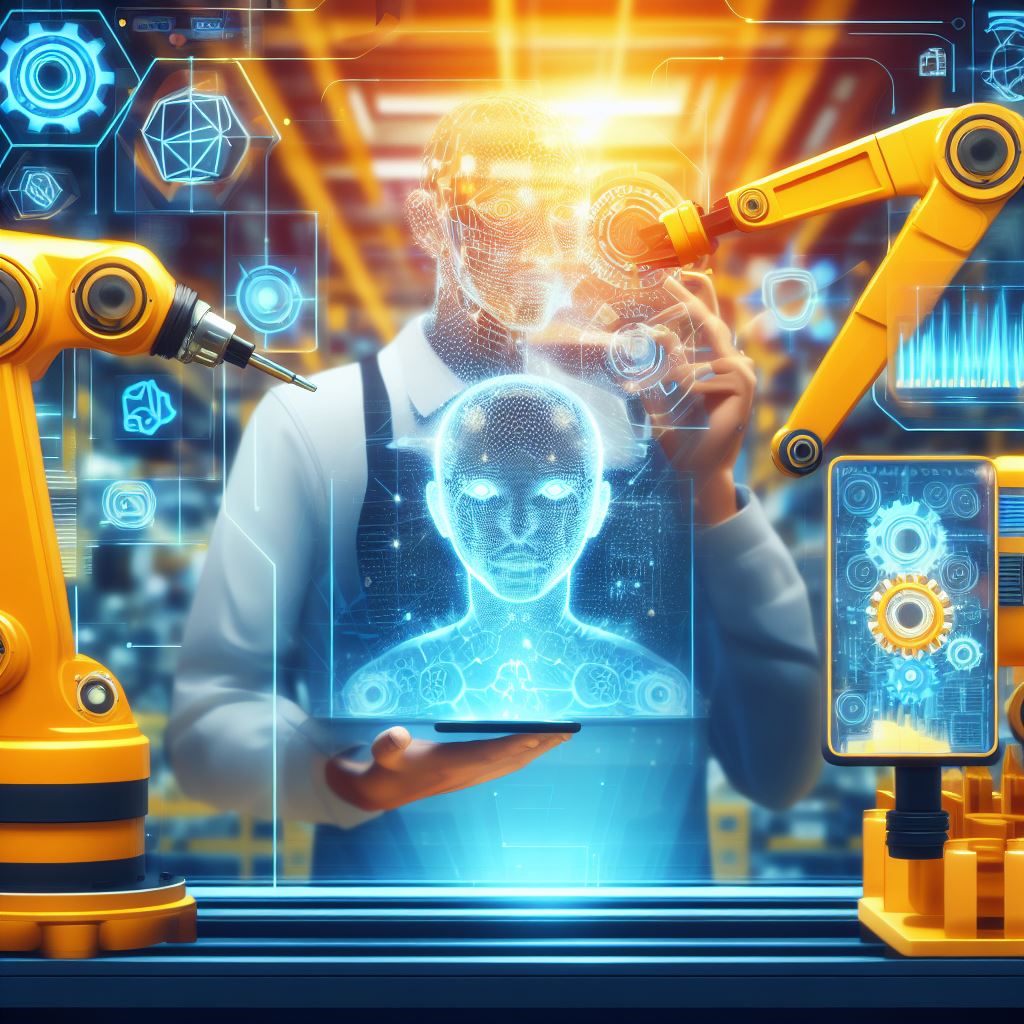AI in Smart Cities: Building Smarter Cities
October 25, 2023 | by insighttechdaily.com

Table of Contents
The Role of Artificial Intelligence in Transforming Urban Environments
Urban environments are constantly evolving, and with the rapid advancement of technology, artificial intelligence (AI) has emerged as a promising tool in revolutionizing these settings. AI has the potential to transform urban environments by making them more efficient, sustainable, and interconnected. By leveraging AI-driven solutions in various sectors such as transportation, energy management, and public safety, cities can improve the quality of life for their residents and create a more sustainable future.
One major contribution of AI in urban environments is its ability to enhance efficiency and sustainability. Through AI-driven solutions, cities can optimize resource allocation, reduce waste, and streamline processes. For example, AI-based data analytics can be used to optimize urban planning and infrastructure, allowing for smarter growth and development.
AI can also revolutionize transportation systems with its intelligent traffic management capabilities, reducing congestion and improving overall efficiency. By leveraging AI in energy management, cities can achieve more sustainable and eco-friendly practices, reducing energy consumption and carbon emissions. These advancements not only benefit the city as a whole but also contribute to a healthier and more livable environment for its residents.
Enhancing Efficiency and Sustainability through AI-driven Solutions
The integration of artificial intelligence (AI) in urban environments has brought forth various solutions that enhance efficiency and sustainability. By leveraging AI-driven technologies, cities can optimize their operations and resource allocation, resulting in more streamlined processes and reduced waste. For instance, AI-powered data analytics can analyze vast amounts of information to identify patterns and trends, enabling better urban planning and infrastructure development. This, in turn, leads to more effective utilization of resources and improved decision-making.
AI also plays a crucial role in enhancing sustainability in cities. Through intelligent energy management systems, AI can monitor and control energy consumption, optimizing usage and reducing waste. This not only helps in minimizing environmental impact but also contributes to cost savings for both individuals and the community as a whole. Furthermore, AI-driven applications facilitate citizen engagement, allowing residents to actively participate in sustainable practices and contribute to the overall efficiency of the city. With AI at the forefront, cities can harness the power of technology to foster greener, more sustainable urban environments.
Leveraging Data Analytics to Optimize Urban Planning and Infrastructure
The power of data analytics in urban planning and infrastructure optimization cannot be overstated. By leveraging advanced data analytics tools and techniques, city planners and stakeholders can gain valuable insights into the various aspects of urban development. From population trends and mobility patterns to resource consumption and environmental impact, data analytics can provide a comprehensive understanding of a city’s needs and challenges.
One of the key benefits of data analytics in urban planning is the ability to identify trends and predict future developments. By analyzing vast amounts of data, city planners can uncover patterns and correlations that can inform their decision-making process. This enables them to identify areas of improvement, optimize existing infrastructure, and plan for future development in a more efficient and targeted manner. With data-driven insights, urban planning becomes more proactive, responsive, and effective, ultimately leading to sustainable and resilient cities.
Improving Public Safety and Security with AI-enabled Technologies
Public safety and security are paramount concerns in today’s urban environments. With the rapid advancement of artificial intelligence (AI) technologies, there has been a significant transformation in how cities can enhance safety measures. AI-enabled technologies offer sophisticated surveillance systems that can monitor public spaces and instantly detect potential threats, thereby enabling proactive prevention of criminal activities.
These systems utilize advanced algorithms to analyze real-time data from various sources such as surveillance cameras, sensors, and social media feeds, allowing law enforcement agencies to respond quickly and effectively to potential security breaches.
One of the key advantages of AI in public safety is its ability to automate and streamline the process of threat detection. Traditional surveillance methods often rely on human operators who may overlook or misinterpret critical information due to fatigue or lack of attention. However, with AI, these systems can analyze large volumes of data with unparalleled speed and accuracy, ensuring that no potential threat goes unnoticed.
Moreover, AI-powered technologies can also forecast potential crime hotspots based on historical data and patterns, allowing law enforcement agencies to allocate their resources more efficiently and prevent criminal activities before they even occur. By harnessing the power of AI, cities can significantly improve public safety and security, providing citizens with a greater sense of protection and peace of mind.
Revolutionizing Transportation Systems with Intelligent Traffic Management
Intelligent traffic management systems have the potential to revolutionize transportation systems in cities around the world. By harnessing the power of artificial intelligence (AI) algorithms and advanced data analytics, these systems can optimize traffic flow, improve road safety, and reduce congestion.
One of the key benefits of intelligent traffic management is its ability to dynamically respond to changing traffic conditions in real-time. Through the use of sensors, cameras, and other connected devices, these systems can gather data about traffic patterns, congestion levels, and accidents. With this information, AI algorithms can then make informed decisions about traffic signal timings, lane configurations, and detour routes to optimize traffic flow.
The result is a more efficient and smooth transportation system that not only reduces travel time for commuters but also minimizes carbon emissions by reducing the idling time of vehicles in traffic.
Intelligent Energy Management for Sustainable and Eco-friendly Cities
In the pursuit of sustainable and eco-friendly cities, the role of intelligent energy management cannot be overlooked. With the growing concern about climate change and the need for efficient resource utilization, cities around the world are increasingly turning to artificial intelligence (AI) to optimize energy consumption and reduce environmental impact.
AI-driven energy management systems have the potential to transform cities into smart grids that efficiently distribute and manage energy resources. By continuously analyzing real-time data from various sources, such as smart meters, weather forecasts, and occupancy sensors, these systems can intelligently adjust energy production, distribution, and consumption in response to demand fluctuations and environmental conditions. This not only helps reduce energy wastage but also ensures a stable power supply, which is crucial for sustainable development.
Furthermore, intelligent energy management can enable cities to integrate renewable energy sources more effectively. As the world races towards achieving carbon neutrality, cities are increasingly adopting solar panels, wind turbines, and other renewable energy technologies. By leveraging AI algorithms, energy management systems can optimize the utilization of these renewable sources, ensuring they are seamlessly integrated into the existing power grid. This not only reduces dependency on fossil fuels but also contributes to the overall reduction of greenhouse gas emissions.
In conclusion, intelligent energy management holds immense potential for creating sustainable and eco-friendly cities. By harnessing the power of AI and data analytics, cities can optimize energy consumption, integrate renewable sources, and reduce environmental impact. However, in implementing these solutions, it is important to address challenges such as data security, privacy concerns, and ethical considerations to ensure a responsible and equitable transition towards smarter cities.
Enhancing Citizen Engagement and Participation through AI-driven Applications
The advent of artificial intelligence (AI) technology has brought about numerous advancements in various sectors, including urban environments. One area where AI has garnered particular attention is in enhancing citizen engagement and participation. By leveraging AI-driven applications, cities are now able to create more inclusive and participatory environments for their residents.
AI-powered platforms can facilitate easier accessibility to information and resources, thus empowering citizens to actively engage in decision-making processes. For instance, AI chatbots can provide real-time information on city services, events, and policies, enabling residents to stay informed and voice their opinions. Additionally, AI algorithms can analyze citizen feedback and sentiment from various sources such as social media, online surveys, and public forums.
This data-driven approach allows city officials to gain valuable insights into citizen preferences and concerns, enabling them to make data-informed decisions that better align with the needs and expectations of the community. Through AI-driven applications, cities are fostering a stronger sense of ownership and participation among citizens, ultimately leading to more inclusive and democratic urban environments.
AI-powered Healthcare Solutions for Smarter and Healthier Cities
AI-powered healthcare solutions are playing a significant role in transforming urban environments by making cities smarter and healthier. With the integration of artificial intelligence, healthcare systems are becoming more efficient and accessible, leading to improved patient outcomes and overall public health. AI algorithms and machine learning techniques are being applied to analyze vast amounts of medical data, enabling healthcare providers to make faster and more accurate diagnoses, devise personalized treatment plans, and predict disease outbreaks.
One of the key benefits of AI in healthcare is its ability to automate routine tasks, freeing up healthcare professionals’ time and allowing them to focus on providing high-quality care. Virtual assistants and chatbots powered by AI are being used to triage patients, answer common medical queries, and provide support for self-care.
Additionally, AI is revolutionizing medical imaging by enabling intelligent analysis of scans, leading to early detection of diseases such as cancer and improving the accuracy of interpretations. Overall, these AI-powered healthcare solutions are enhancing efficiency, reducing healthcare costs, and ultimately making cities healthier and more resilient.
Overcoming Challenges and Ethical Considerations in Implementing AI in Smart Cities
As smart cities continue to embrace artificial intelligence (AI) technologies for various applications, there are several challenges and ethical considerations that need to be addressed. One of the main challenges is ensuring data privacy and security. With the vast amount of data being collected and analyzed, there is a risk of it being misused or falling into the wrong hands. Therefore, it is crucial to establish robust data protection measures and encryption protocols to safeguard sensitive information.
Another challenge is the potential bias in AI algorithms. AI systems are only as good as the data they are trained on, and if this data is biased or lacks diversity, it can lead to discriminatory outcomes. This is particularly concerning when it comes to decision-making processes in areas such as law enforcement, healthcare, and public services.
To overcome this challenge, it is essential to ensure that AI systems are trained on diverse and representative datasets, and regular audits are conducted to identify and mitigate any biases that may arise. Furthermore, transparent and explainable AI models can provide insights into the decision-making process, enabling humans to understand and address any biases that may occur.
Future Prospects: The Evolution of AI in Building Smarter Cities
Artificial intelligence (AI) has propelled the development of smarter cities, presenting exciting future prospects. As technology continues to advance, the evolution of AI in urban environments holds immense potential. With the ability to process vast amounts of data and make accurate predictions, AI can revolutionize how we design, plan, and manage cities.
One of the key future prospects of AI in building smarter cities is the optimization of resource allocation and energy management. AI-powered systems can analyze data from various sources, such as sensors and smart grids, to determine patterns and make informed decisions about energy consumption. By intelligently managing energy usage, cities can reduce their carbon footprint, improve sustainability, and enhance the overall quality of life for residents. Additionally, AI can enable predictive maintenance of infrastructure, helping cities identify potential issues before they become major problems, thus reducing repair costs and minimizing disruptions to daily life.
FAQs
What is the role of artificial intelligence in transforming urban environments?
Artificial intelligence plays a crucial role in transforming urban environments by enabling smarter and more efficient cities. It helps in optimizing various aspects such as urban planning, infrastructure, public safety, transportation, energy management, citizen engagement, healthcare, and more.
How does AI enhance efficiency and sustainability in cities?
AI-driven solutions enhance efficiency and sustainability in cities by analyzing vast amounts of data to optimize various processes. It can help in reducing energy consumption, optimizing traffic flow, improving waste management, and enhancing resource allocation, among other things.
How does AI leverage data analytics for urban planning and infrastructure?
AI leverages data analytics to analyze various data sources such as traffic patterns, population density, and infrastructure usage. This analysis helps in optimizing urban planning and infrastructure development, leading to more efficient and well-designed cities.
How does AI improve public safety and security in cities?
AI-enabled technologies improve public safety and security in cities by analyzing data from various sources such as surveillance cameras, social media, and emergency services. It can detect and respond to potential threats, aid in crime prevention, and improve emergency response systems.
How does AI revolutionize transportation systems in cities?
AI revolutionizes transportation systems by enabling intelligent traffic management. It utilizes real-time data and predictive analytics to optimize traffic flow, reduce congestion, and improve transportation efficiency. AI also plays a crucial role in the development and implementation of autonomous vehicles.
How does AI contribute to intelligent energy management in cities?
AI enables intelligent energy management by analyzing data on energy consumption, weather patterns, and building usage. It helps in optimizing energy distribution, identifying energy-saving opportunities, and promoting eco-friendly practices, ultimately leading to more sustainable and energy-efficient cities.
How does AI enhance citizen engagement and participation in cities?
AI-driven applications enhance citizen engagement and participation by providing personalized services, facilitating feedback mechanisms, and enabling active involvement in decision-making processes. This fosters a sense of community and empowers citizens to contribute to the development of their cities.
How does AI power healthcare solutions in cities?
AI-powered healthcare solutions improve healthcare services in cities by analyzing medical data, assisting in diagnosis, and optimizing healthcare resource allocation. It enables more efficient healthcare delivery, personalized treatment plans, and early detection of diseases, leading to smarter and healthier cities.
What challenges and ethical considerations need to be addressed in implementing AI in smart cities?
Implementing AI in smart cities requires addressing challenges such as data privacy, security risks, algorithm bias, and job displacement. Ethical considerations include ensuring transparency, accountability, and fairness in AI systems, as well as safeguarding against potential misuse of AI technologies.
What are the future prospects of AI in building smarter cities?
The future prospects of AI in building smarter cities are vast. Advancements in AI technologies will continue to drive innovation in urban environments, leading to even more efficient and sustainable cities. AI will play a crucial role in addressing future challenges and shaping the cities of tomorrow.
RELATED POSTS
View all


